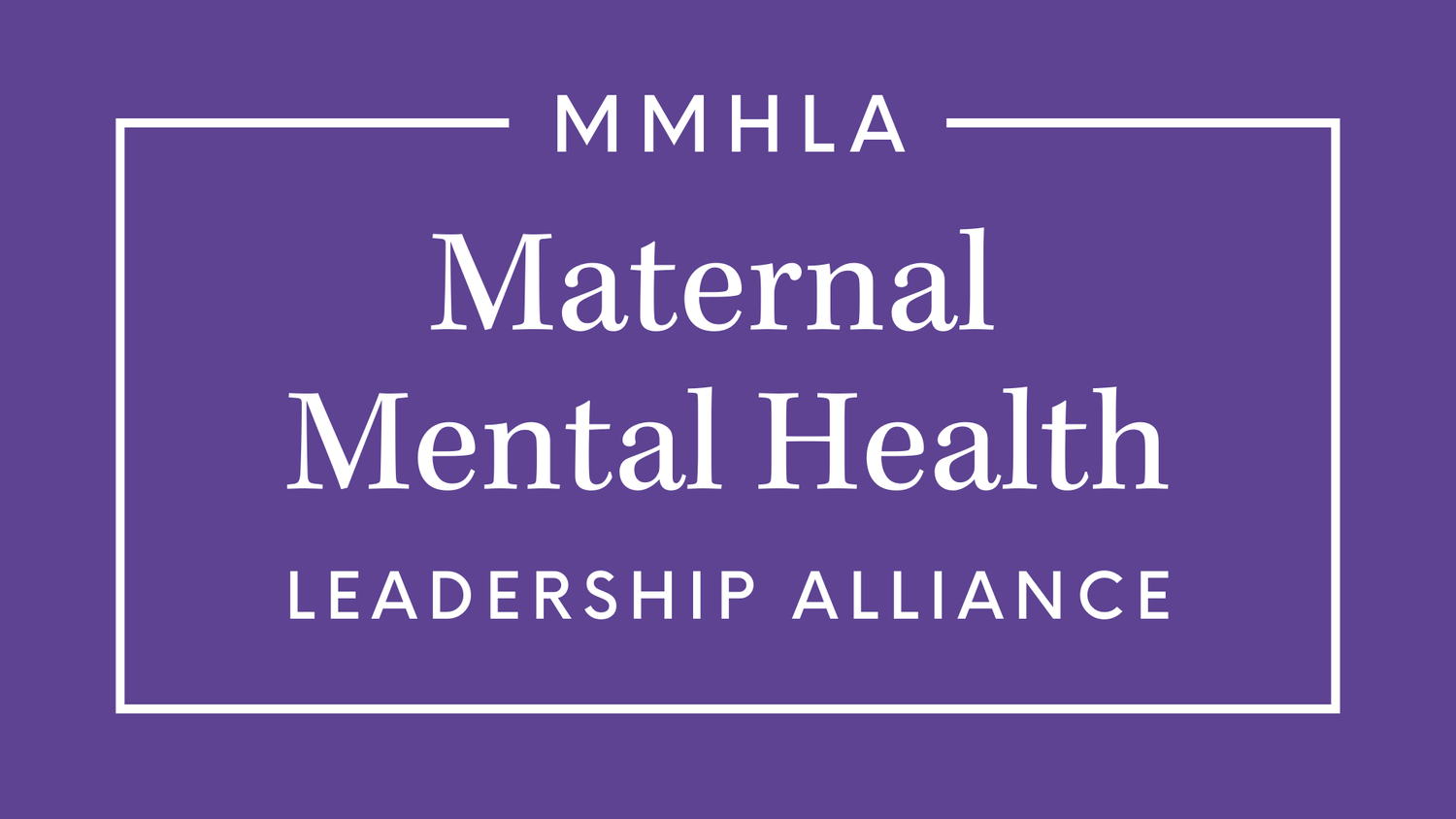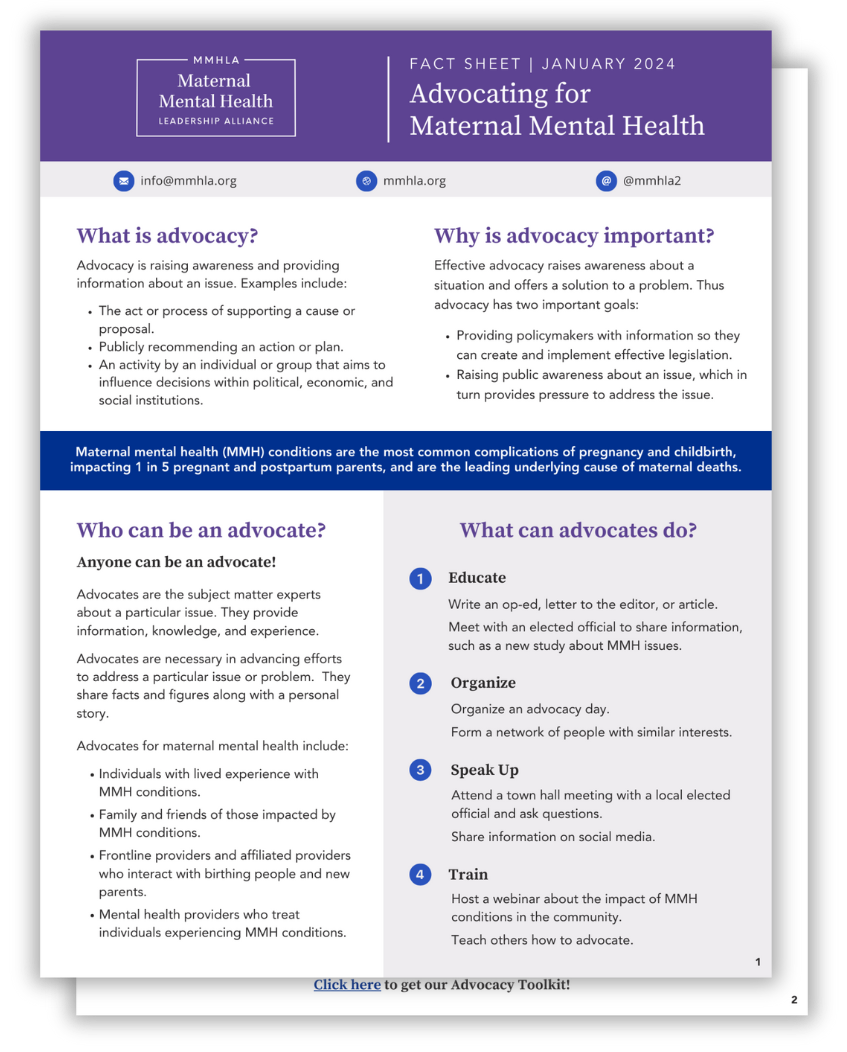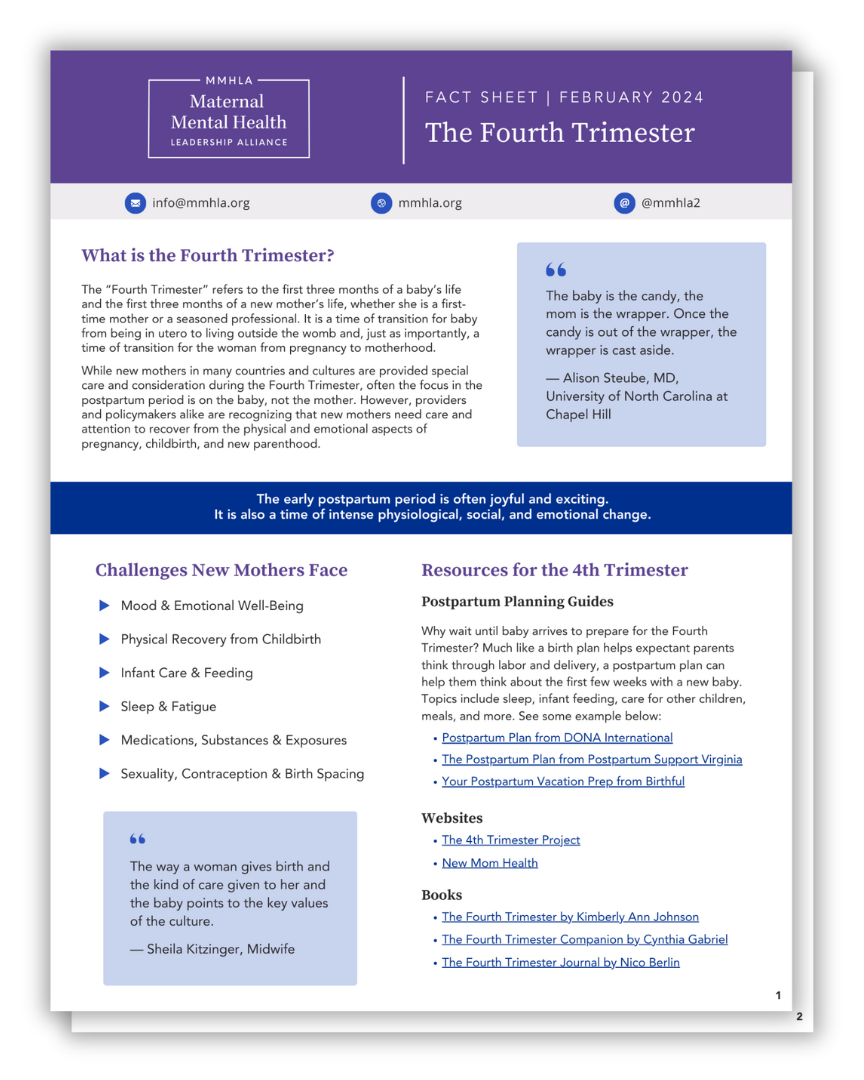Topic Fact Sheets
Our evidence-based fact sheets cover a range of maternal mental health topics.
Have feedback? Share your thoughts here.
Sign up for our newsletter for resources, news, events, and more in the maternal mental health field!
Maternal Mental Health Overview
This Fact Sheet provides an overview of maternal mental health conditions, prevalence, disparities, barriers to care, steps to wellness, and links to resources.
Advocating for Maternal Mental Health
This Fact Sheet provides information about advocacy: what it is, why it is important, and how to be an advocate. The bottom line: advocacy is about education, and anyone can be an advocate! MMHLA has also created a detailed Advocacy Toolkit which provides specific examples of advocacy opportunities.
Birth Trauma and Maternal Mental Health
One in three birthing people report feeling traumatized by their childbirth experience and approximately 17% of birthing people will experience symptoms of post-traumatic stress. Birth trauma can cause significant psychological distress or harm to the birthing person, affecting both physical and mental health, and frequently impacting future reproductive health and decision-making. Learn more about birth trauma, PTSD, and their impact on maternal mental health.
Black Women, Birthing People, and Maternal Mental Health
Almost 40% of Black mothers and birthing people experience MMH conditions. Compared to white women, Black women are twice as likely to experience MMH conditions but half as likely to receive treatment. This Fact Sheet discusses how social determinants of health impact Black people, includes information about Black-women-led organizations addressing maternal health, and identifies barriers to care as well as strategies to overcome these barriers.
Components of Mental Health and Wellness for Pregnancy and Postpartum
Becoming a parent can be overwhelming. There is so much information out there that it can be challenging to know where to go for the best tips and information. To make preparation easier for expectant parents, we created this evidence-based fact sheet that covers the six components of mental health and wellness that support a positive pregnancy and postpartum experience.
Disability, Pregnancy, and Maternal Mental Health
One of the most frequent concerns raised by women with disabilities is a lack of health care professional knowledge and awareness about how their disability could affect their pregnancy and how pregnancy might affect disability-related symptoms, progression, and other concerns. Likewise, health care professionals report a lack of training and insufficient resources related to disability. This fact sheet aims to increase knowledge among healthcare providers so that pregnant people with disabilities can receive more effective care.
Fourth Trimester
This Fact Sheet highlights the Fourth Trimester (the first 3 months following birth) as a much-needed time of rest, recovery, and transition for new mothers. All too often, the focus is on the baby, not the mother. However, new mothers need to recover from the physical and emotional aspects of pregnancy, childbirth, and new parenthood.
Infant Feeding and Parental Mental Health
Human milk is widely considered to be the optimal food for infants, yet fewer than 25% of babies in the U.S. receive exclusive human milk at 6 months of age. This fact sheet shares evidence-based information on the mental health-related challenges parents face with infant feeding, including hormones & mood, racial & cultural challenges, prescription medications, sleep disturbances, and more.
Maternal Mental Health: Impact on the Child
The mental health of the mother during pregnancy and the first year postpartum is critical to the development of the child across several domains: physical, cognitive, social, and emotional. In this fact sheet, we outline the impact of untreated maternal mental health conditions on the child as well as various interventions and resources to support the health and well-being of the mother-infant dyad.
Military, Veteran Women, and Maternal Mental Health
Active duty Military, Veterans, and their spouses are at a higher risk of experiencing maternal mental health conditions than civilians. This is due to many factors: military culture, stigma, frequent moves, and more. In this Fact Sheet, we have compiled and synthesized the latest information about Military and Veteran women to provide education and resources on this topic.
National Maternal Mental Health Hotline
The National Maternal Mental Health Hotline launched on Mother’s Day 2022. The MMH Hotline provides 24/7 voice and text support in English and Spanish, and translation services in an additional 60 languages. Calls are answered by certified mental health and maternal health providers, along with certified peer specialists who provide support, encouragement, information, and resources.
1-833-TLC-MAMA (1-833-852-6262)
National Mental Health Hotlines
Two new mental health hotlines launched in mid-2022: the 988 Suicide & Crisis Lifeline and the National Maternal Mental Health Hotline. This Fact Sheet provides information about these two new resources, as well as Postpartum Support International’s Helpline.
Paternal Mental Health
As many as 1 in 10 dads will experience emotional and mental health challenges during and following their partner’s pregnancy, with the peak onset of depression between 3-6 months following the birth of a baby. Learn the research behind the causes, risk factors, and impacts of paternal depression with this Fact Sheet.
Perinatal Loss and Maternal Mental Health
Perinatal loss, which includes miscarriage, stillbirth, and infant death, deeply impact the mental health of mothers, birthing people, and their partners. In this Fact Sheet, you will learn key facts and figures about perinatal loss, the impact on mental health, how to support bereaved parents, and additional resources that can offer healing and support.
Perinatal Psychiatry Access Programs
Perinatal Psychiatry Access Programs build capacity for frontline providers to address maternal mental health by providing education, consultation, and resources and referrals. This Fact Sheet provides information about how these access programs can help promote the health of mothers and children.
Pregnancy and Postpartum Psychosis
Pregnancy and Postpartum Psychosis (PPP) are medical emergencies, impacting 1-2 individuals per 1,000 births. This Fact Sheet provides additional facts and figures about PPP, along with additional reading and important resources for treatment and recovery.
















